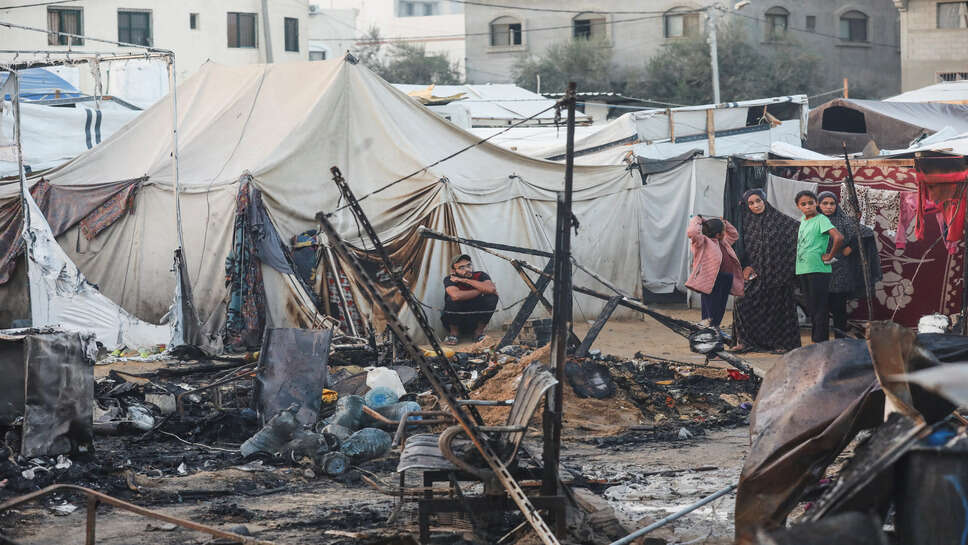UN Condemns Attack on Gaza’s Healing Spaces, Calls for Probe

The United Nations has issued a rare and strongly worded call for justice after a Gaza hospital was hit in a double strike, igniting widespread outrage and intensifying scrutiny of Israel’s military campaign in the region. The statement emphasized that targeting medical facilities violates international humanitarian law, with the UN warning that impunity in such cases threatens the very foundation of global norms meant to protect civilians during war.
The Incident That Shook the World
The hospital attack was not a singular event but a devastating sequence. First came the initial strike, which left staff scrambling to save patients amid fire, debris, and chaos. Barely minutes later, as medical workers and volunteers rushed in to assist the wounded, a second strike hit the same site. Witnesses described scenes of confusion and horror as patients on stretchers, doctors in blood-stained coats, and relatives waiting outside became victims themselves.
Hospitals have long been treated as sanctuaries in conflict zones—spaces where neutrality is supposed to prevail, and where the wounded, regardless of political or military affiliation, can seek treatment. The deliberate or reckless targeting of such facilities is seen as crossing one of the gravest red lines in warfare.
UN’s Unequivocal Stand
“This cannot be brushed aside as collateral damage,” a senior UN spokesperson declared. The choice of words was deliberate, cutting through the usual diplomatic phrasing to stress accountability. The UN’s statement underscored three central points:
-
Hospitals are protected spaces under the Geneva Conventions.
-
Double strikes amplify criminality, as they knowingly target first responders.
-
Justice mechanisms must be triggered, whether through international courts or independent investigations.
The organization’s call echoed sentiments voiced in humanitarian corridors worldwide—that violations of this nature cannot be normalized through silence.
Patterns of Attacks on Medical Facilities
Observers note that the Gaza hospital incident fits a troubling pattern. Over the course of recent escalations, schools, ambulances, and clinics have been damaged or destroyed. Each time, international watchdogs stress the need for impartial investigations, yet meaningful accountability rarely follows.
The UN fears that without concrete consequences, the targeting of hospitals will become increasingly normalized, eroding decades of humanitarian protections built after the devastation of the World Wars.
The Human Toll
Behind the numbers and policy statements lie stories of human tragedy. Mothers holding children who never made it out of the operating ward. Nurses killed while trying to shield premature babies in incubators. Volunteers who rushed in after the first strike, only to become casualties in the second.
Such images, carried across global media, have fueled an outpouring of grief and anger. For many in Gaza, hospitals represent not just treatment centers but rare symbols of resilience and survival. Their destruction is thus more than a tactical assault; it is a psychological blow against an already besieged population.
International Humanitarian Law and the Question of Intent
Central to the debate is whether the attack was intentional or accidental. International humanitarian law (IHL) stipulates that medical facilities are protected unless used to commit acts harmful to the enemy, and even then, adequate warning must be given. A double strike, however, raises particularly troubling questions:
-
Was the second strike deliberately aimed at rescuers and medical personnel?
-
If not, how could the same site be hit twice within such a narrow timeframe?
-
What intelligence justified the operation, and was it verified?
These questions underscore the UN’s insistence that a transparent, independent investigation is the only way to establish truth and justice.
Calls for Accountability
Human rights organizations, humanitarian NGOs, and legal experts have amplified the UN’s stance. They argue that the attack amounts to a war crime, and that failure to prosecute those responsible sets a dangerous precedent. Calls have been made for:
-
Referral to the International Criminal Court (ICC) for potential prosecution.
-
Independent UN investigations with access to evidence, testimonies, and satellite imagery.
-
Global pressure through sanctions or diplomatic measures to deter further attacks.
The message is clear: justice is not optional but a moral and legal imperative.
Israel’s Position
Israeli officials, while not dismissing the incident outright, have often justified strikes in Gaza as responses to militants allegedly operating from civilian areas. In past cases, Israel has argued that medical facilities were used to shield fighters or store weapons. Critics, however, contend that such justifications cannot excuse the predictable harm caused to vulnerable civilians, especially when strikes are repeated at the same site.
The UN’s statement marks a departure from cautious language, signaling that explanations alone will not suffice without rigorous independent verification.
Wider Implications
The hospital strike reverberates far beyond Gaza. It intensifies debates about the credibility of international law, the effectiveness of humanitarian protections, and the world’s ability to enforce norms against powerful states. If a hospital can be struck twice without consequence, what hope remains for schools, shelters, or refugee camps in other conflicts?
For the UN, the issue is not just about Gaza but about preserving the global architecture of humanitarian law. Allowing such attacks to go unpunished risks dismantling protections that safeguard civilians in conflicts from Ukraine to Sudan.
The Humanitarian Crisis in Gaza
Even before the hospital strike, Gaza’s health system was under immense strain. Shortages of electricity, medicines, and medical equipment had left doctors performing surgeries with minimal resources. The destruction of one of its key hospitals is not just a tragic loss of life in the moment—it also cripples long-term capacity to treat future patients.
This amplifies the humanitarian emergency, leaving thousands without adequate care and forcing the few remaining medical centers to shoulder impossible burdens.
What Justice Could Look Like
Justice, in this context, is not merely punitive. It involves:
-
Acknowledgement: Public recognition of wrongdoing and accountability.
-
Compensation: Support for victims’ families and rebuilding destroyed medical facilities.
-
Prevention: Concrete steps to ensure hospitals and civilians are protected in future conflicts.
The UN’s call for justice is therefore about more than trials; it is about restoring dignity to victims and reasserting the principle that even in war, humanity must prevail.
A Global Outcry
Around the world, the double strike has triggered protests, vigils, and debates in parliaments. Citizens from different countries, regardless of political affiliation, have expressed solidarity with Gaza’s medical workers and patients. The symbolism of attacking a hospital—a place universally associated with healing—resonates across cultures and borders.
This groundswell of outrage may pressure governments to reconsider arms sales, diplomatic cover, or silence in international forums.
A Test of Global Conscience
The UN’s demand for justice following the double strike on a Gaza hospital is not simply about one tragic event. It is about defending the idea that even in the darkest moments of war, certain lines must never be crossed.
“There needs to be justice,” the UN emphasized—a plea that goes beyond legal jargon and speaks directly to the conscience of the international community. Whether the world responds with concrete action or allows the moment to pass will determine not only the fate of Gaza’s civilians but also the credibility of humanitarian law itself.
If hospitals can burn without consequence, then the promise of protection for civilians everywhere risks burning with them.
